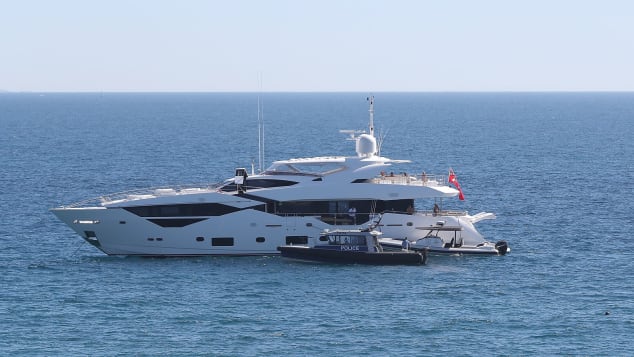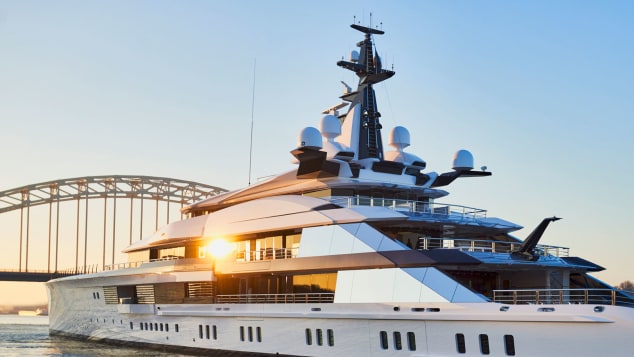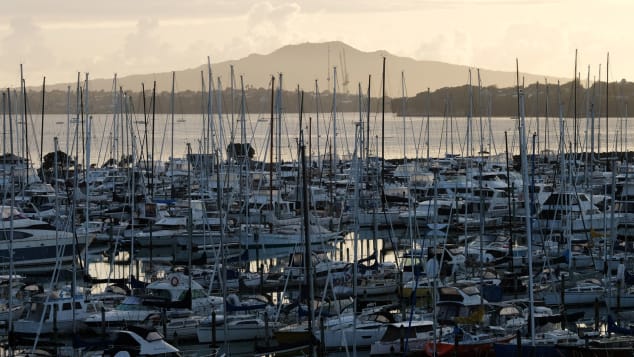
Tamara Hardingham-Gill, CNN • Published 15th April 2020
(CNN) — When entertainment mogul David Geffen shared an image of his superyacht “Rising Sun” at sea alongside the caption “isolated in the Grenadines” last month, it’s fair to say the post ruffled a few feathers.
However well-meaning his message may have been intended, many felt the billionaire came off as tone deaf, pointing out that self-isolating on a $590 million superyacht (pictured in 2017, above) during the coronavirus pandemic didn’t seem like much of a hardship.
In fact, the reaction was so strong, he later deleted the post, which included the message, “I’m hoping everybody is staying safe.”
However, in the weeks since then, various stories have emerged of the uber rich hopping on private jets and going into quarantine onboard a luxury yacht.
But given the ongoing travel restrictions across the world — not to mention that, while advice may differ from country to country, people are by and large being instructed to “stay at home” — is yacht operation even possible at the moment?
For those owners with a full crew who are stationed in a location where supplies can be brought over to them, it seems it’s very much possible, albeit something of a rarity.
“We have a limited number of private yacht owners who have elected to isolate on their yachts,” Rupert Connor from Luxury Yacht Group LLC tells CNN Travel.
“The most amazing sanctuary”

A police boat pulls over a yacht sailing in the waters of Australia while unnecessary travel is prohibited.
Paul Kane/Getty Images
“When you know your yacht and crew well, it is a very wonderful oasis from the madness that is enveloping the world.
“Many of the larger yachts have supplies for long range cruising, their engineering systems can support them for months at a time and most of the crew have medical training.”
According to Connor, those who are isolating on their yachts aren’t actually moving.
Instead they’re “sticking to an island group where they can receive air freight provisions” and plan to remain there until the global restrictions are lifted.
While a few customers have expressed an interest in long-term yacht charters for the purpose of self-isolation, this isn’t a service the company is currently able to offer due to the level of risk involved.
“The truths of this disease have changed too rapidly for anyone to make solid decisions that involve a yacht charter where the client doesn’t know the crew or owner’s health history,” he explains.
“And I don’t think the science is yet available to be able to state that a yacht is ‘clean’.”
However, it seems there are some yacht brokers who are continuing to offer charters in special circumstances.
“When you know your yacht and crew well, it is a very wonderful oasis from the madness that is enveloping the world.” Rupert Connor, Luxury Yacht Group
Jonathan Beckett, CEO of luxury yacht broker Burgess, recently told luxury lifestyle magazine Robb Report that a select few customers have booked seven-week and four-week charters for their families “to see out the pandemic.”
“They will be home schooling, but the children will also have cooking lessons with the chef and spending time in the engine room with the engineers learning the more technical sides of yachting,” he said.
Luxury Yacht Group hopes to be able to offer a similar experience when yacht charter companies are able to carry out adequate testing on both passengers and crew.
“Once we have onboard testing for both Covid-19 antibodies for people who have had the disease and testing for the actual disease itself, a yacht is going to be the most amazing sanctuary.”
For many of us, an enormous yacht situated in an exotic location certainly seems like an “amazing sanctuary” for self-isolation, so it’s no surprise that customers are keen to get on board.
Stationery yachts

Oceanco, the shipyard behind luxury yacht Bravo Eugenia, are continuing to work on new projects during the crisis.
Courtesy Francisco Martinez
However, Rumble Romagnoli, CEO of Relevance, a luxury digital marketing company headquartered in iconic yachting destination Monaco, is skeptical of the notion, pointing out that the practicalities involved make it an unfeasible choice for most.
“I think it’s a bit unrealistic to think people are going to swan off, get on board a yacht and just sit in the middle of the sea,” he says.
He also stresses that being stuck in the middle of the sea for weeks on end would prove tedious for most, even if they have lavish amenities at their disposal — “Rising Sun” has a wine cellar and a basketball court onboard.
“These billionaires and multi-millionaires don’t just stay on a yacht for two to three months. It’s not that pleasurable,” he adds.
“They fly over, get on a yacht, go to a restaurant, get off the yacht for lunch, go to a nightclub, get a helicopter somewhere else.
“It’s not like a villa. It can be quite claustrophobic.”
Also, with a full crew on board, as well as passengers, the risk of possible infection cannot be ignored.
“These billionaires and multi-millionaires don’t just stay on a yacht for two to three months. It’s not that pleasurable.” Rumble Romagnoli, CEO of Relevance
But if no-one is getting on or off, it’s easy to see why some would choose to remain at sea, particularly if supplies are being brought over in a regulated manner and members of the crew are medically-trained.
However, those hoping to charter a luxury yacht in order to follow suit shouldn’t get too excited just yet.
The current global travel restrictions make reaching a yacht very difficult — a group of Cannes-bound passengers on a private jet which flew from London to Marseilles Airport earlier this month, breaching a ban on non-essential travel within France, was met by police and refused entry.
Taking a trip on a yacht would also be going against the current “stay at home” instructions in place across the world — many of those who’ve sailed off to destinations such as the Caribbean and the South Pacific will have done so before restrictions were put in place.
Then there’s the rather important fact that almost all charter bookings have been canceled, crews are being sent home, and the upcoming Mediterranean season is in jeopardy.
Packed ports

Hundreds of yachts and boats docked on the harbor in Auckland, New Zealand.
Bradley White/Getty Images
“Everyone’s on hold, waiting for some idea of when the season will open,” says Romagnoli.
“I believe there are no yachts out there. Some crew members are being released from their duties. Captains and first mates are losing their jobs.
“Some boats are coming out of the water and being wrapped up.”
Connor also notes that most of his company’s charter fleet have “taken up long term dockage.”
“The docks in Fort Lauderdale (and everywhere in the world) are full and crew are bunkered down onboard, if they are fortunate to have been kept on contract.
“Our main charter season runs from spring to late September, so we are projecting that coronavirus will decimate our 2020 revenues.
“Any charters already booked for the summer are nervously waiting for good news but realistically face cancellation.”
But although almost all sailing has stopped, work is continuing at shipyards across the world.
Paris Baloumis, marketing manager for Netherlands-based Oceanco, tells CNN Travel his team is working “with enhanced measures” on various projects, despite the high level of uncertainty.
“The coronavirus has definitely also affected the yachting industry,” he says, lamenting the many industry events that have been postponed or canceled.
“As a builder we have various projects under construction and have therefore taken all necessary safety measures to secure this process as far as possible.”
Not only are shipyards like Oceanco carrying on with projects, people are still buying and selling yachts, with brokers offering virtual tours in some cases.
“As soon as they drop the restrictions on movement, I’m sure there will be the biggest Black Friday of yacht charters ever known.” Rumble Romagnoli
“I’m already fielding calls from strong sellers and trying to connect them with the few prospective buyers who have already started to sense an opportunity,” says Connor, adding that some clients will likely be forced to sell as a result of the economic effects of the coronavirus crisis.
And while no at-home tests have been approved by bodies such as the US Food and Drug Administration as yet, he’s optimistic this will change in the coming months, opening up many doors for charters.
“The timing for at-home testing will hopefully coincide with the re-opening of international borders and we can then send our yachts out to sea before the summer is completely gone,” he adds.
Romagnoli is also staying positive about the future of yacht chartering, stressing that customers are more eager than ever to get back out there.
“As soon as they drop the restrictions on movement,” he says. “I’m sure there will be the biggest Black Friday of yacht charters ever known.”
Until then, everyone is just waiting for the current situation to play out, but a select few just happen to be waiting onboard a yacht in international waters.



Sorry, the comment form is closed at this time.